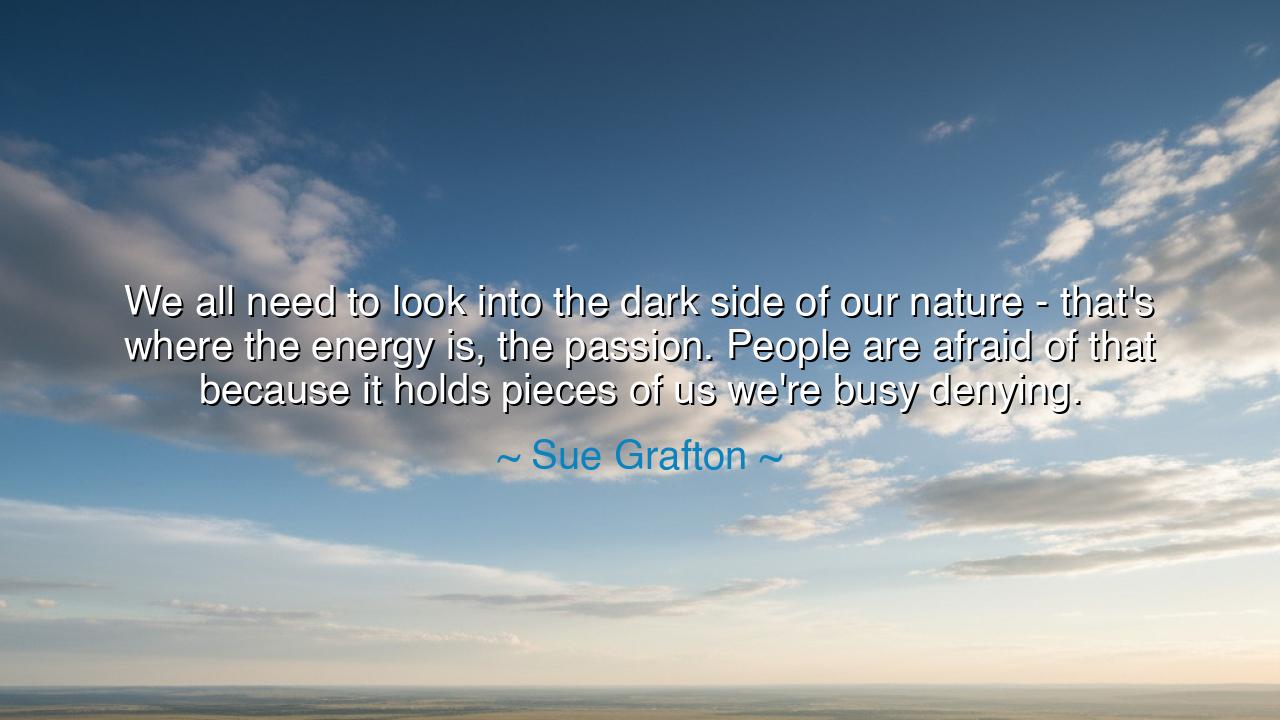
We all need to look into the dark side of our nature - that's
We all need to look into the dark side of our nature - that's where the energy is, the passion. People are afraid of that because it holds pieces of us we're busy denying.






Sue Grafton, the teller of mysteries, once spoke with fearless honesty: “We all need to look into the dark side of our nature—that's where the energy is, the passion. People are afraid of that because it holds pieces of us we're busy denying.” These words strike like a torch in the night, illuminating the hidden chambers of the human soul. For within each of us lies not only gentleness and light, but also shadow, storm, and fire. To deny this shadow is to deny our wholeness, and to fear it is to forfeit the very force that can drive creation, courage, and transformation.
The meaning of this quote lies in the paradox that what we fear most in ourselves may also be what gives us the greatest strength. The dark side—our anger, our jealousy, our hunger, our grief—is not merely corruption to be cast away, but raw material waiting to be refined. Grafton reveals a truth known to the ancients: that within the shadow is the spark of energy and passion. If we bury it, we weaken ourselves; if we confront it, we gain power. The danger is not in having darkness, but in refusing to face it.
The origin of such wisdom comes from Grafton’s craft as a writer of crime and mystery. She dwelt in stories where human beings wrestled with greed, fear, lust, and violence. Yet she did not write merely of villains—she understood that the same impulses live in us all, hidden beneath the polite surface of daily life. Her words remind us that the human heart is not divided into saint and monster, but is one whole, and that both shadow and light belong to our nature.
History itself offers testimony to this truth. Consider the story of Martin Luther King Jr. He was a man of peace, but his fire did not come from ignoring the rage of oppression—it came from channeling it. He looked into the dark side of suffering, injustice, and anger, and from it drew the energy to march, to speak, to stand unbroken against violence. His greatness was not the absence of shadow, but his ability to transform its passion into light. So too with Gandhi, who acknowledged his own temper and will, yet forged them into tools of discipline and change.
Yet, many are afraid to peer into their own depths. They deny jealousy, bury grief, suppress anger, and pretend weakness does not exist. But what is denied festers in silence. It leaks into our words, poisons our actions, and returns upon us as despair. Grafton warns that fear of the self is the true enemy. For if we deny pieces of ourselves, we live as fragments, never whole. To be whole is to claim even the shadow, to master it, and to weave it into the fabric of who we are.
The lesson is clear: we must face ourselves with courage. Look into the places of the heart you would rather not see. Ask yourself: What am I denying? What passion have I buried? What wound have I locked away? For in these places lie the roots of creativity, resilience, and truth. The artist draws from them, the leader learns from them, and the wise live at peace with them. To fear them is to live half a life; to embrace them is to awaken fully.
Practically, this means we must practice honesty with ourselves. Write your fears in journals, speak your grief to trusted friends, express your anger through art or action that builds rather than destroys. Do not numb the dark side, but shape it. Learn to use it as a forge, a source of heat that tempers your character. In this way, you transform shadow into strength, denial into freedom, fear into fuel.
So let Sue Grafton’s words be your guide: the dark side of your nature is not your enemy, but your wellspring of energy and passion. To deny it is to weaken yourself; to embrace it is to become whole. Walk into your own depths, face what dwells there, and rise stronger, truer, and more alive. For only when we unite both our light and our darkness do we stand as complete human beings, capable of shaping both ourselves and the world.






AAdministratorAdministrator
Welcome, honored guests. Please leave a comment, we will respond soon